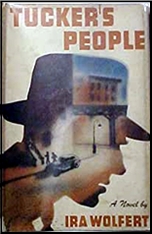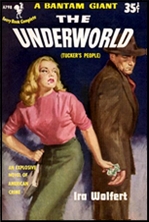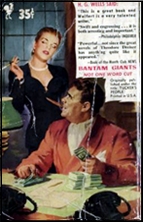Fri 24 Feb 2023
IRA WOLFERT – Tucker’s People. L.B. Fischer, hardcover, 1943. Bantam Giant A798, paperback 1950, as The Underworld. University of Illinois Press, softcover, 1997. Film: Basis for Force of Evil, directed by Abraham Polonsky and starring John Garfield.

Wolfert was a NYC reporter who covered Dutch Schultz. Schultz got big in bootlegging. After repeal he needed a new racket. Numbers seemed like a good bet. In the numbers racket, you pick three numbers. If your 3 number combo hits, you win 600 to 1 on your bet. In 1931, Thanksgiving landed on November 25. 2 + 5 = 7. As a result, numerous numbers players could be predicted to bet on some variation of 2/5/7 on Thanksgiving.
There were scores of independent numbers bankers in Harlem. Dutch figured out a way to fix the numbers coming out that Thanksgiving: 527. This bankrupted Harlem’s numbers bankers. Dutch came to the ‘rescue’ of the bankers, offering to pay off all the winners in exchange for the bankers joining Dutch’s Bank. In this manner Dutch was able to take over and consolidate the Harlem numbers racket, ‘earning’ upwards of $20 million a year.

With that kind of money rolling in, Dutch bought the boss at Tammany Hall: Jimmy Hines. Hines fixed the cops, raided the numbers banks that refused to cave, and looked the other way on the concomitant sleaze and violence accompanying the racket.
Then came along reformer DA Thomas E. Dewey. Dewey couldn’t be bought and he came after Dutch. This tied Dutch’s hands, giving opportunity to competing mobster Lucky Luciano to step up, step in, and take over. By force. And Dutch was slain.
Wolfert took this story, changed the names, and wove it into a fictionalized account: Tucker’s People.

It takes the major players: a numbers banker, an enforcer, a nerdy, nervy numbers accountant, and Dutch’s stand-in (Tucker), and attempts to weave a symphony out of these discordant instruments of the 30’s mobster soundscape.
My copy of the book ran over 500 pages. And it surely felt like it. The prose was leaden and preachy. While the idea for the book was grand, it felt like Wolfert let grand ideological purposes get in the way of a good story. Wolfert appears to have wanted to make the story of Dutch Schultz into a morality play about how monopolies destroy the little guy — first by taking him over financially, then taking his soul. And when the little guy is no longer useful, flushing him down the drain.
I have nothing against morality plays. But nothing destroys a good story like didacticism. If Wolfert was a better writer, he might’ve been able to make it work. Similar grand efforts have been successful. Like Robert Deane Pharr’s Book of Numbers and Vern E. Smith’s The Jones Men. Sadly, this one doesn’t join them.
Made into the film Force of Evil in 1948, starring John Garfield:
February 24th, 2023 at 11:03 pm
I found the film version well produced and acted, with some serious pretentious moments, and they all worked for me. Memorable in its way, ahead of time, but not brilliant. Not Chinatown, The Maltese Falcon, or Johnny O’Clock, of which there are elements if not direct references. As political as it was possible to be.
February 24th, 2023 at 11:15 pm
The fellow who posted the film on YouTube has a whole library of film noir uploaded there. Let’s see if this link will work. I hope so, because I see he has quite a few I’ve never been able to watch before now, and of course an equal number I wouldn’t mind seeing again:
https://www.youtube.com/@leifsfilm-noirchannel5842/videos
February 24th, 2023 at 11:55 pm
As Barry says, the film is not great and sometimes get a bit pretentious it is mostly a solid gangster noir with strong performances by Garfield and Thomas Gomez.
I liked the book a little better than Tony,but have no argument with his judgment or criticism of it. It is wordy, too often a thinly disguised economic and social tract instead of a compelling novel.
It needs less self-importance and social conscious and more melodrama and action.
February 25th, 2023 at 2:37 pm
Dutch Shultz wrote – or, rather, spoke – a surrealist masterpiece in his last moments – https://www.babyfacenelsonjournal.com/last-words.html – which have inspired writers, cartoonists and parody anthology compilers ever since.